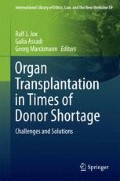Abstract
In this chapter I will examine to what extent altruism arguments are likely to increase the willingness to donate organs. The working hypothesis is that altruism arguments are unsuitable for that purpose. In order to demonstrate this, I will first deal with the concept of altruism. In a second step, I will look into the motivational nature of altruistic actions and present this as a problem in the face of organ shortage. Due to the ethical and political challenge to tackle organ shortage we urgently need binding measures. In a third step I will suggest that not altruism but solidarity is the key word in promoting organ donation. For that purpose, I will argue that a model based on that value of solidarity is suitable to justify other policy interventions that might increase donation rates. Finally, I would like to draw attention in the meaning of justice (as fairness) for the success of these actions.
Access this chapter
Tax calculation will be finalised at checkout
Purchases are for personal use only
Notes
- 1.
“Altruism, long promulgated as the only ethical basis for donation of bodily material, should continue to play a central role in ethical thinking in this field. While some of the claims made for altruism may be overblown, the notion of altruism as underpinning important communal values expresses something very significant about the kind of society in which we wish to live. Understood in this way, altruism has much in common with solidarity: an altruistic basis for donation helps underpin a communal, and collective, approach to the provision of bodily material for others’ needs, where generosity and compassion are valued”. Nuffield Council on Bioethics (2011, p. 5).
- 2.
- 3.
- 4.
Maurer (1971).
- 5.
For Comte, moral obligations are not derived from theological precepts; instead, they are understood in the context of social relations. As a result of socialization, human beings are able to have inherently altruistic inclinations and prosper.
- 6.
Nagel (1979).
- 7.
Blum (2009).
- 8.
Batson (2011).
- 9.
- 10.
Birnbacher (2008).
- 11.
Also McBride and Seglow understand altruism in relation to supererogation. McBride and Seglow (2003).
- 12.
The largest religious communities consider organ donation as a good act for charity's sake, so even religious persons believe that post-mortem organ donation should not constitute harm.
- 13.
Wiesing (2012).
- 14.
This is the quintessence of the ethical philosophy from the French philosopher Emmanuel Levinas. Levinas (1984).
- 15.
Birnbacher says, „daß in puncto Organtransplantation die Sache einen vermehrten moralischen Druck rechtfertigt.“ Birnbacher (2008, p. 314).
- 16.
Saunders (2012).
- 17.
Steinmeier (2012).
- 18.
Prainsack and Buyx (2011).
References
Altruism. 2013. In Encyclopædia Britannica. http://www.britannica.com/EBchecked/topic/17855/altruism. Accessed 20 March 2013.
Batson, C. D. 2011. Altruism in humans. New York: Oxford University Press.
Birnbacher, D. 2008. Organtransplantation - Stand der ethischen Debatte. In Ethik in der Medizin. Ein Studienbuch, ed. U. Wiesing. Stuttgart: Reclam.
Blum, L. A. 2009. Friendship, Altruism and Morality. Reissue edition (Routledge Revivals). New York: Routledge.
Breyer, F. 2008. Möglichkeiten und Grenzen des Marktes im Gesundheitswesen. In Ethik in der Medizin. Ein Studienbuch, ed. U. Wiesing. Stuttgart: Reclam.
De Wispelaere, J. 2002. Altruism, impartiality and moral demands. Critical Review of International Social and Political Philosophy 5 (4): 9–33.
Goodwin, M., ed. 2013. The global body market: Altruism’s limits. Cambridge: Cambridge University Press.
Heyd, D. 2013. Supererogation. In The stanford encyclopedia of philosophy (Winter 2012 Edition), ed. E. N. Zalta. http://plato.stanford.edu/archives/win2012/entries/supererogation/. Accessed 20 March 2013.
Levinas, E. 1984. Totalité et Infini. 4. Aufl. Berlin: Springer.
Mahoney, J. D. 2009. Altruism, markets, and organ procurement. Law and Contemporary Problems 72:17–36.
Maurer, R. K. 1971. Altruismus. In Historisches Wörterbuch der Philosophie, eds. J. Ritter, K. Gründer, and G. Gabriel, vol. 1, 200–201. Basel: Schwabe
McBride, C., and J. Seglow. 2003. Introduction: Egoism, altruism and impartiality. Res Publica 9 (3): 213–222.
Moorlock, G., J. Ives, and H. Draper 2013. Altruism in organ donation: An unnecessary requirement? Journal of Medical Ethics 40: 134–138.
Nagel, T. 1979. The Possibility of altruism. Reissue edition. Princeton: Princeton University Press.
NHS Blood and Transplant. 2012. Organ donation. The gift of life. http://www.organdonation.nhs.uk/newsroom/fact_sheets/language_leaflets/organ. Accessed 20 March 2013.
Nuffield Council on Bioethics. 2011. Human bodies: donation for medicine and research. London: Nuffield Council on Bioethics.
Prainsack, B., and A. Buyx. 2011. Solidarity: Reflections on an emerging concept in bioethics. London: Nuffield Council on Bioethics.
Saunders, B. 2012. Altruism or solidarity? The motives for organ donation and two proposals. Bioethics 26 (7): 376–381.
Schischkoff, G. 1991. Wörterbuch der Philosophie. Stuttgart: Kröner.
Steinmeier, F.W. 2012. Organ donation is true solidarity. European Journal of Cardio-Thoracic Surgery 41 (2): 240–241.
Wiesing, U. 2012. Plädoyer zur Organspende: Mehr Mut für ein hilfreiches Geschenk. Spiegel Online. http://www.spiegel.de/gesundheit/diagnose/organspende-ethiker-plaediert-fuer-mehr-transplantationen-a-835319.html. Accessed 20 March 2013.
Author information
Authors and Affiliations
Corresponding author
Editor information
Editors and Affiliations
Rights and permissions
Copyright information
© 2016 Springer International Publishing Switzerland
About this chapter
Cite this chapter
Aurenque, D. (2016). Why Altruism is not a Convincing Argument for Promoting Post-mortem Organ Donation: Responsibility and Solidarity as Key Concepts. In: Jox, R., Assadi, G., Marckmann, G. (eds) Organ Transplantation in Times of Donor Shortage. International Library of Ethics, Law, and the New Medicine, vol 59. Springer, Cham. https://doi.org/10.1007/978-3-319-16441-0_6
Download citation
DOI: https://doi.org/10.1007/978-3-319-16441-0_6
Published:
Publisher Name: Springer, Cham
Print ISBN: 978-3-319-16440-3
Online ISBN: 978-3-319-16441-0
eBook Packages: Religion and PhilosophyPhilosophy and Religion (R0)

